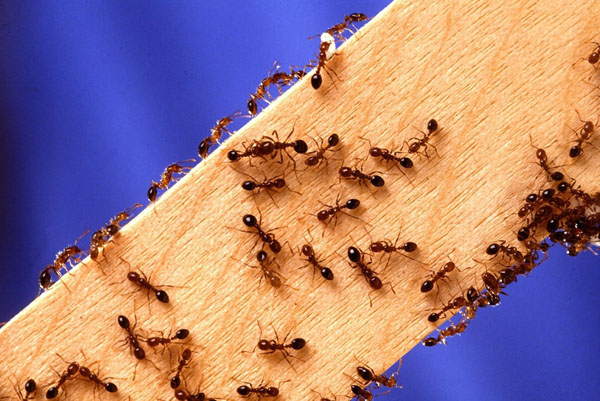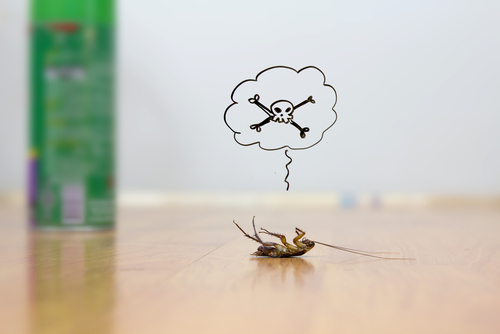Exterminating Pests: A Guide to Family-Friendly IPM Pest Warfare

Your home is a safe haven for your family, a harbor from the rough waters of life, an abode full of treasured memories and love. But sometimes it can become a home for uninvited guests of the six-legged variety. When this occurs, it's time to take action. Addressing and preventing pest infestations keeps your family healthy and staves off potential damages to your home. Here are the steps necessary to take before and after noticing signs of pests in your home.
#1: Set a Threshold
In contrast to old-school seek-and-destroy methods of dealing with pests, the more modern, moderate and effective approach is the implementation of Integrated Pest Management (IPM). Described as a series of evaluations, informed decisions and control actions, IPM manages pest issues economically, with minimal risk to the environment, property and people.
The first step in an IPM program is to decide what the pest threshold is in your home. Catching a glimpse of one bug scurrying off into the night does not qualify as an emergency. You and your family need to come to a consensus based on the quantity and frequency of sightings as to if the presence of pests in your home poses an economical, environmental or health threat to you or your loved ones.
#2: Know Thy Enemy
After defining your problem perimeters, the next step in this process is to know what you are dealing with. By identifying and researching the type of pest, you will know what it is you are up against. Different insects require different tactics, so before declaring war, learn their behaviors and motivations and understand their weaknesses. Plus, the more you know about your unwelcome visitors, the more likely you will be able to prevent infestations in the future.

#3: Understand the Dangers
When most people think of pest control, they automatically think of pesticides. Though clearly they are a mild form of chemical warfare, pesticides have been widely utilized since the 1950s. It was not until recently that the health and safety of users, as well as the possibility of negative environmental effects, came into question. In the U.S., the average citizen has more that 40 different kinds of pesticides present in their system, according to the U.S. Centers for Disease Control and Prevention. These are not the ingredients of a healthy, happy family home, especially since children have weaker immune systems than adults and tend to spend more time in close proximity to the floor, the surface where pesticides are usually applied.
Children are also more vulnerable to the toxins found in pesticides and exposure to these chemicals could potentially cause neurological complications. Extreme subjection to weed killers, pesticides and insecticides has been linked to the onset of learning disabilities, and 50 percent of pesticide poisoning cases in America have been in children under the age of six.
#4: Prevent and Defend
Not only do traditional pesticides pose threats to humans and the environment, but they are sometimes ineffective. Many products only target pests at one phase in the life cycle, usually the adult phase, leaving larvae to hatch and perpetuate the infestation. In some cases, the insects develop an immunity or resistance to the pesticide, making the infestation even worse.
If you are attempting to fend off your family garden from nefarious attackers, instead of using pesticides, try alternating the kinds of crops you plant, using pest-resistant varieties and prepping the garden area with pest-free rootstock. Inside your home, repair any torn or broken door and window screens and caulk all cracks in your kitchen and bathrooms. Plug any openings that are bigger than one quarter inch with steel wool or cement to prevent vermin like mice from crawling through or chewing through the material.
#5: Assert Control
If you have completed steps one through four and still have unwanted guests, it is time to select a method of control. In this phase, the Environmental Protection Agency (EPA) recommends you take into consideration two things: risk and effectiveness. Try less abrasive pest treatments first, like disrupting and disorienting the invaders through the use of pheromones or non-toxic traps. If necessary, more aggressive control methods should be employed through targeted and limited use of pesticide sprays.
Want to estimate your home improvement costs before talking with a contractor? Claim your home for free with bluehammer to estimate costs, secure your home inventory and learn more about your home.
* THIS REPORT IS AN OPINION THAT MAY BE INACCURATE AND IS PROVIDED SOLELY AS AN INFORMATIONAL TOOL NOT DESIGNED TO PROVIDE DEFINITIVE ANSWERS. ALL ELEMENTS ARE OFFERED "AS IS" AND BLUEBOOK EXPRESSLY DISCLAIM ANY AND ALL WARRANTIES, REPRESENTATIONS, AND GUARANTEES OF ANY NATURE, EXPRESS, IMPLIED OR OTHERWISE, INCLUDING BUT NOT LIMITED TO ANY IMPLIED WARRANTIES OF MERCHANTABLITILY, NONINFRINGEMENT, TITLE, QUIET ENJOYMENT, ACCURACY, OR FITNESS FOR A PARTICULAR PURPOSE. IN NO EVENT SHALL BLUEBOOK (OR THEIR SUPPLIERS) BE LIABLE FOR ANY GENERAL, DIRECT, SPECIAL, INCIDENTAL, INDIRECT OR CONSEQUENTIAL DAMAGES OF ANY KIND, OR ANY DAMAGES WHATSOEVER (INCLUDING WITHOUT LIMITATION, THOSE RESULTING FROM USE OF THE PRODUCT, INCLUDING : (1) RELIANCE ON THE MATERIALS PRESENTED, (2) COSTS OF REPLACEMENT GOODS, (3) LOSS OF USE, DATA OR PROFITS, (4) DELAYS OR BUSINESS INTERRUPTIONS, (5) AND ANY THEORY OF LIABILITY, ARISING OUT OF OR IN CONNECTION WITH THE USE OR PERFORMANCE OF INFORMATION) WHETHER OR NOT BLUEBOOK HAS BEEN ADVISED OF THE POSSIBILITY OF SUCH DAMAGES.